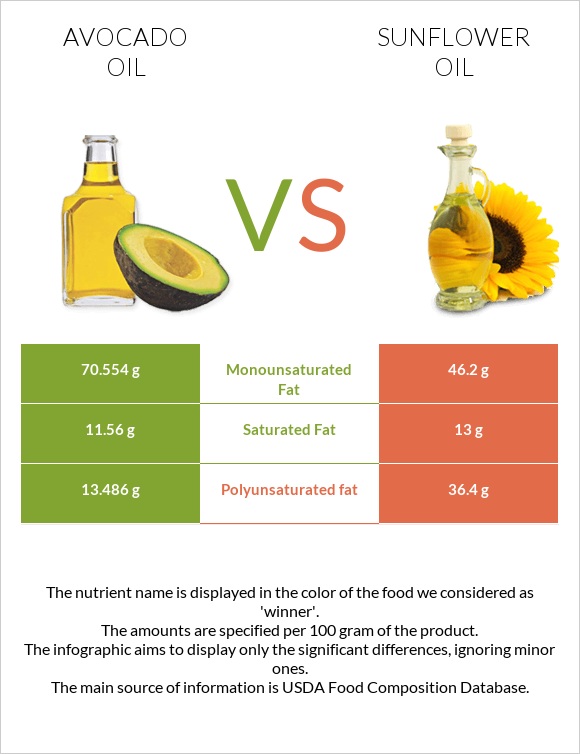Avocado oil vs. Sunflower oil — Health Impact and Nutrition Comparison


Summary
Sunflower oil is richer in vitamin E and 2.6 times richer in polyunsaturated fat. In comparison, avocado oil is 1.5 times richer in monounsaturated fat with a higher smoke point. However, avocado oil is more expensive and has a stronger flavor that can be overwhelming.
Introduction
We will compare two oil types in this article; sunflower oil and avocado oil. Both these oils are classified as vegetable oils; however, there are several differences between them.
These differences are according to some general aspects regarding taste, price, usage, and smoke point. The other differences are related to nutritional composition and health impacts.
General differences
Taste
Taste is one of the main differences between avocado oil and sunflower oil. Avocado oil has a stronger and earthier taste compared to sunflower oil. Sunflower oil, when used for cooking, has a neutral taste.
Price
Sunflower oil is cheaper than avocado oil since its mostly available worldwide and is cheaper to produce.
Smoke point and usage
Avocado oil has a higher smoke point than sunflower oil. Avocado oil has a smoke point of 270°C compared to sunflower oil which has 232°C.
Both these oils are used in high-temperature cooking since they won't release carcinogens and free radicals as they heat up. Sunflower oil, with its availability, lower price, and neutral flavor, makes it a more used oil in cooking and frying.
Nutritional content comparison
This section will consider refined versions of both of these oils.
Calories
Sunflower and avocado oil have similar calories, 884 calories per 100g. These oils are high in calories.
Carbs and protein
They are pure oils that are 100% fat by weight composition.
Fats
The fat composition is different between these two oils.
The total fats are equal to 100g per 100g of oil. However, the difference is between the types of fats in these oils.
Avocado oil contains 1.5 times more monounsaturated fats than sunflower oil. Avocado oil contains 70g of monounsaturated fats compared to sunflower oil which contains 46g.
Sunflower oil is richer in polyunsaturated fats by 2.6 times than avocado oil.
Sunflower oil contains 36g of polyunsaturated fats compared to 14g of avocado oil.
The amount of saturated fats is similar. 11g for avocado oil and 13g for sunflower oil.
Mineral
The mineral profiles are negligible for both oils.
Vitamins
Sunflower oil is richer in vitamin E and K. Noting that the vitamin K content is insignificant.
Health impacts
Cardiovascular health
Foods high in unsaturated fats are associated with decreased atherosclerosis risks and cardiovascular mortality rates compared to foods high in saturated fats. (1)(2)
In addition, it is important to note that oils that are richer in polyunsaturated fats are an even better option than monounsaturated fats. (3)(4)
You can also read the following articles to compare these oil types to other famous ones:
Avocado oil vs. Canola
Avocado oil vs. Peanut oil
Sunflower oil vs. Peanut oil
Vitamin E benefits
Sunflower oil is richer in vitamin E, providing anticarcinogenic, antioxidative, and immune-supporting benefits. (5)
Infographic

Mineral Comparison
Vitamin Comparison
All nutrients comparison - raw data values
| Nutrient |  |
 |
DV% diff. |
| Vitamin E | 41.08mg | 274% | |
| Polyunsaturated fat | 13.486g | 36.4g | 153% |
| Monounsaturated fat | 70.554g | 46.2g | 61% |
| Saturated fat | 11.56g | 13g | 7% |
| Vitamin K | 5.4µg | 5% | |
| Calories | 884kcal | 884kcal | 0% |
| Fats | 100g | 100g | 0% |
Macronutrient Comparison
Fat Type Comparison
| Contains less Sat. FatSaturated fat | -11.1% |
| Contains more Mono. FatMonounsaturated fat | +52.7% |
| Contains more Poly. FatPolyunsaturated fat | +169.9% |
People also compare
References
All the values for which the sources are not specified explicitly are taken from FDA’s Food Central. The exact link to the food presented on this page can be found below.
- Avocado oil - https://fdc.nal.usda.gov/fdc-app.html#/food-details/173573/nutrients
- Sunflower oil - https://fdc.nal.usda.gov/fdc-app.html#/food-details/172328/nutrients
All the Daily Values are presented for males aged 31-50, for 2000-calorie diets.






